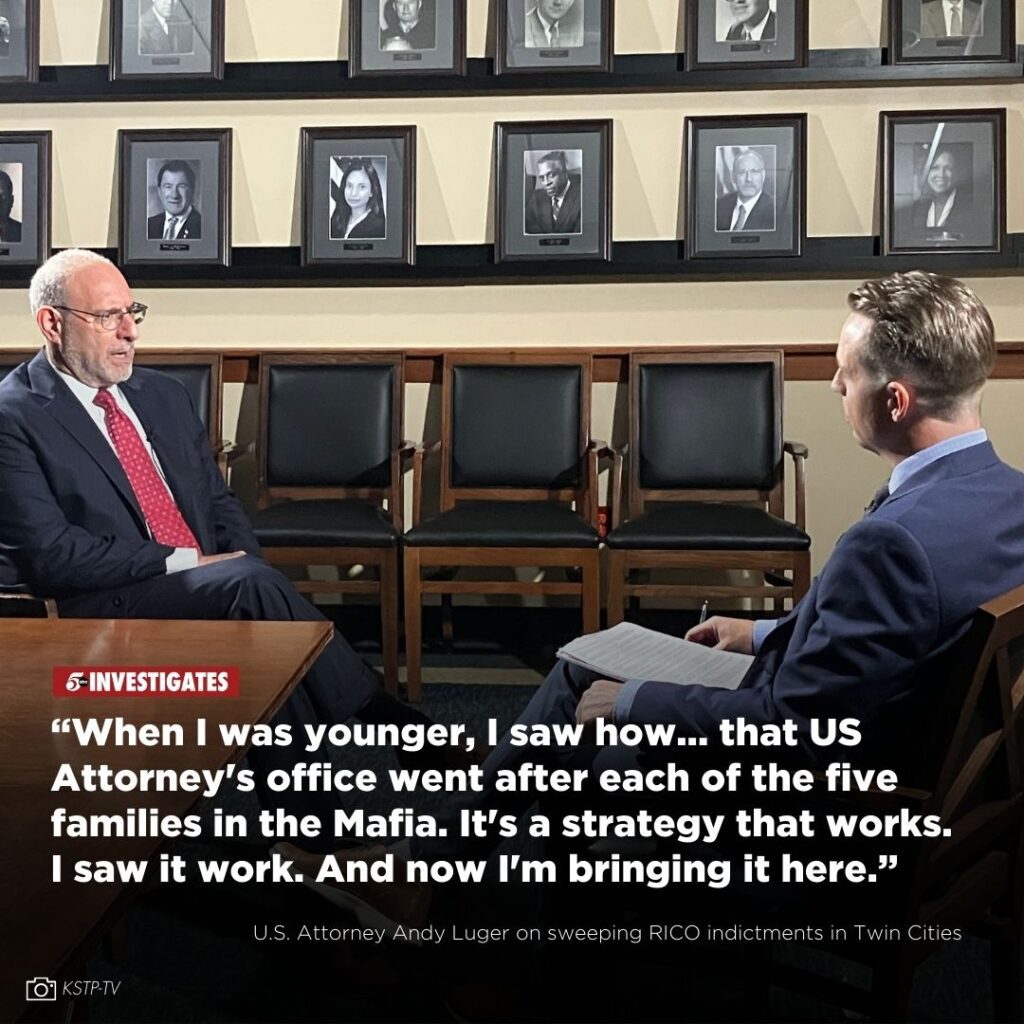RICO broke up the Mafia in New York. Will it bring down violent crime in Minneapolis?
Another suspected gang member is changing his plea as part of an unprecedented investigation into violent crime in the Twin Cities.
Doug Mobley pled guilty on Wednesday in federal court to one count of RICO conspiracy. He’s one of more than 60 alleged gang members indicted and the fifth to plead guilty since federal prosecutors announced their sprawling, new strategy earlier this year.
“We can build these cases more easily if people cooperate,” said Andy Luger, U.S. Attorney for the District of Minnesota. “Every single person we charge we believe deserves federal prison time. That’s why we’re doing it.”
In an interview with 5 INVESTIGATES earlier this year, Luger said he first used the RICO Act while working as a federal prosecutor in Brooklyn in the 1980s when mob violence was spilling into the streets.
“When I was younger, I saw how the organized crime section of that U.S. Attorney’s Office went after each of the five families in the mafia,” Luger said. “It’s a strategy that works. I saw it work. And now I’m bringing it here.”
It’s the first time RICO has been used on gangs in the Twin Cities.
The aggressive strategy, which has been used on gangs in other major cities, is welcomed by victims’ families. But critics say the feds are overreaching.
“How do we know that somebody is or is not a member of an organization?” said Fred Goetz, a defense attorney who represents one of the defendants indicted on RICO charges earlier this year.
A family’s grief
In September 2021, a suspected gang member opened fire on Harvey Williams while he was behind the wheel of his car.
Traffic cameras caught the aftermath as he lost control, went over a bridge and landed on Interstate 94.
The feds said Williams’ murder was a targeted gang hit.
Tracy Davis believes her son was killed because of a high school grudge that followed him for years after he turned his life around.
“I can play through my head 100 times a day to know my last words are to be safe, I love you, and have a good day,” she said.
Williams found his purpose as a teacher at KIPP Academy in north Minneapolis.
“The kids would smile when they seen him,” she said.
In May, nearly two years after her son’s murder, Davis said she felt relief when she received a call from the U.S. Attorney’s Office about the sweeping indictments.
“We don’t want to see any more parents suffer the same way,” she said.

At a press conference later that day, Luger explained why he was launching a complex conspiracy case instead of individual charges for murder and other violent crimes.
“Rather than prosecuting one person at a time, one case at a time, we decided to put the extra work and the attention and resources toward addressing the gangs as the criminal organizations they are,” Luger said.
RICO and the mob
Congress passed the Racketeer Influenced and Corrupt Organization Act in 1970.
Widely known as RICO, it was created to target mafia organizations such as the Five Families in New York City.
“This was meant to go after the mafia. You had meetings, you had structure, you had organization, and it was defined,” said Fred Goetz, the defense attorney in Minneapolis. “That’s not the case when you’re talking about poor kids from north Minneapolis.”
His criticism is echoed in recent research published in 2021 in the Berkeley Journal of Criminal Law.
Author Lucy Litt argued that the use of RICO on street gangs “sweeps up many people who are not involved in the targeted organizations.”
Luger pushed back on that criticism.
“Exactly the opposite,” he said. “This is not a sweep. By focusing our attention on known, active gang members, we’re actually limiting the number of people that we’re targeting for investigation and prosecution.”
Luger said the recent string of guilty pleas — in which defendants admit to the entire organization’s role in the crime — prove the unprecedented strategy is already having an impact.
Luger declined to say how many gang members are currently operating in the Twin Cities.
“There will be fewer as we go forward,” he said.